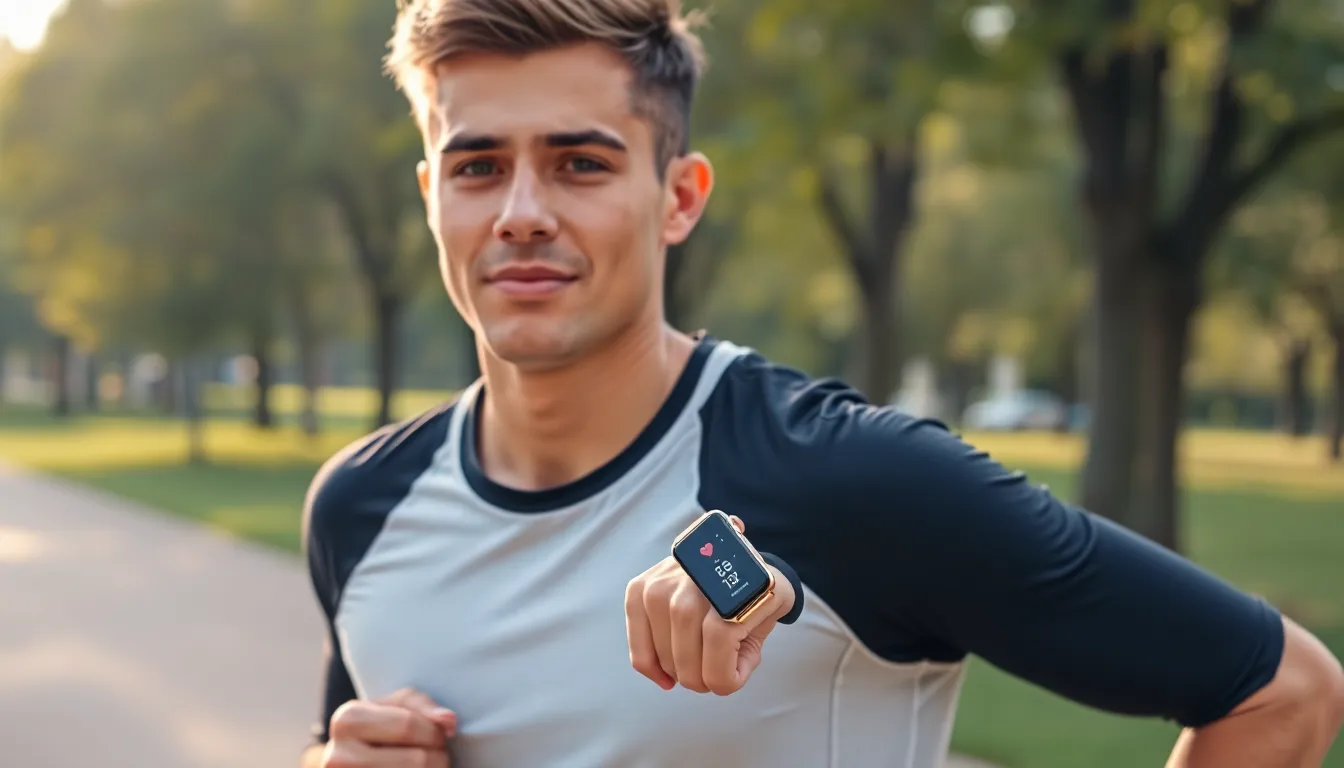Table of Contents
ToggleIn a world where tracking steps is as common as checking the weather, health data wearables have become the new must-have accessory. Forget about just counting calories; these nifty gadgets are like having a personal trainer strapped to your wrist—minus the guilt trips. They monitor everything from heart rate to sleep patterns, giving users insights that can transform their health journeys.
Imagine strutting around with a device that not only tells you when to move but also nudges you to drink water—because let’s face it, hydration is key. With health data wearables, staying fit has never been more entertaining or informative. Whether you’re a fitness fanatic or just looking to improve your daily routine, these gadgets are here to help you make sense of your health, one beep at a time.
Overview of Health Data Wearables
Health data wearables consist of various devices designed to track and monitor health metrics. They collect data on physical activity, heart rate, sleep quality, and more. In daily use, these wearables provide users with instant feedback about their health status.
Fitness trackers are among the most common types of health wearables. Many include step counters, distance trackers, and calorie burn estimations. Smartwatches now incorporate fitness tracking features, allowing users to receive notifications while monitoring their well-being. The functionality of these devices extends beyond exercise, often offering reminders for hydration and inactivity.
Sleep monitors, another category of health wearables, analyze sleep patterns and duration. Users gain insights into their sleep quality, helping them to improve rest. By tracking sleep data, users can make informed adjustments to their routines, leading to better overall health.
Heart rate monitors serve as critical tools for many individuals. Athletes depend on accurate heart rate readings to optimize training and recovery. Even casual users benefit from this information, allowing for tailored workout intensity and monitoring stress levels.
Health data wearables often connect to mobile applications. These apps aggregate data from devices, making it easier for users to visualize their health trends. The ability to track progress over time enhances motivation, encouraging long-term lifestyle changes.
Integrating social features into health wearables facilitates community engagement. Users often share achievements and challenges with friends, fostering accountability and support. This connectivity not only motivates individuals but also builds a sense of camaraderie among users.
The rise of health data wearables signifies a shift toward proactive health management. Users now possess the tools to understand and improve their wellness actively. Data-driven insights empower users to make healthier choices in their daily lives.
Types of Health Data Wearables

Health data wearables come in various forms, each designed to address specific health and fitness needs. These devices help users monitor their wellbeing through innovative technologies.
Fitness Trackers
Fitness trackers primarily focus on physical activity. They typically include features such as step counting, distance measurement, and calorie tracking. Sensors in these devices monitor movement, providing real-time feedback on daily activity levels. Additionally, many fitness trackers sync with mobile apps, allowing users to set goals and analyze their performance over time. Popular models also incorporate heart rate monitoring and sleep analysis, making them versatile tools for enhancing overall health.
Smartwatches
Smartwatches combine fitness tracking with smart technology. Users benefit from notifications, calendar updates, and messaging capabilities, all while keeping track of their health metrics. These devices often feature heart rate monitors, GPS functionalities, and even ECG capabilities in some advanced models. Health data collected through smartwatches integrates seamlessly with health apps, giving users a comprehensive overview of their wellness. Their ability to connect with other smart devices adds convenience, enhancing daily life while promoting a healthier lifestyle.
Medical Devices
Medical devices within the health wearable space are designed for clinical purposes. Examples include continuous glucose monitors and wearable ECG monitors. These devices provide crucial health data for ongoing monitoring of chronic conditions. Accuracy in data collection is critical, allowing healthcare professionals to make informed decisions regarding patient care. Many medical wearables feature alerts for abnormal readings, enabling timely intervention. As technology advances, these devices become more accessible, improving health management for patients everywhere.
Benefits of Health Data Wearables
Health data wearables offer various advantages that significantly enhance daily wellness. Users gain access to continuous health monitoring through these devices, enabling proactive management of their well-being.
Improved Health Monitoring
Real-time health monitoring equips individuals with critical insights into their physical conditions. These wearables track vital signs like heart rate and oxygen levels, providing alerts for any anomalies. Users better understand their health trends and take necessary actions promptly. For example, someone might notice an uptick in their heart rate during a workout, ensuring they adjust their intensity. Continuous glucose monitors alert diabetic patients to fluctuating levels, which is crucial for effective management. The data gathered allows users to make informed decisions regarding exercise routines and dietary choices.
Enhanced Motivation
Health data wearables serve as powerful motivators for individuals seeking to adopt healthier lifestyles. These devices help users set precise fitness goals, like achieving a certain number of steps each day or hitting a specific heart rate zone during workouts. Notifications and reminders offer encouragement, prompting users to meet their daily objectives. For instance, receiving a nudging notification to walk more can inspire one to take the stairs instead of the elevator. Additionally, the integration of social features allows users to share their progress with friends and family, fostering a sense of accountability and community support.
Challenges and Considerations
Health data wearables present unique challenges that users must navigate. Ensuring awareness of these factors is essential for making the most of these devices.
Data Privacy and Security
Data privacy concerns arise as wearables collect sensitive health information. Users often share personal data with mobile applications and cloud services, increasing vulnerability to breaches. Regulatory frameworks, such as HIPAA, govern the protection of health data, but enforcement can vary. Brands must prioritize user transparency, providing clear privacy policies and options for data management. Users should look for wearables that offer strong encryption and anonymization features. They benefit from reviewing how data is stored and used. Adopting devices with robust security measures can mitigate risks associated with unauthorized access.
Accuracy of Data
Accuracy is crucial for the effectiveness of health data wearables. Devices vary in precision depending on their design and intended use. Fitness trackers often struggle with precise heart rate readings during intense workouts. Smartwatches might miscalculate step counts if not calibrated properly. Users may rely on the data for informed health decisions, making accuracy paramount. Validation from independent studies or organizations enhances trust in wearable brand claims. Comparing data from wearables with medical devices can illuminate discrepancies. Users benefit from selecting devices with strong reputations for accuracy in tracking health metrics.
Future Trends in Health Data Wearables
Innovations in health data wearables are set to redefine personal health management. Advanced sensor technology enhances accuracy, measuring various health metrics with greater precision. For instance, wearable ECG monitors now offer critical insights into heart health that were previously available only through clinical settings.
Artificial intelligence integration into wearables can provide personalized health recommendations. Users benefit from smart algorithms that analyze data patterns, suggesting lifestyle adjustments based on individual habits and preferences. The demand for intuitive, user-friendly interfaces continues to grow, making health data more accessible to everyone.
Wearables increasingly focus on mental health tracking, addressing a vital aspect of well-being. Devices equipped with features for stress monitoring and mood tracking offer a holistic approach to health management. These capabilities enable users to recognize triggers and manage their emotional states effectively.
Regulatory changes are likely to influence the development of medical-grade wearables. As the medical community embraces technology’s role in patient care, manufacturers are encouraged to meet safety and efficacy standards. Clinical validation can enhance the trust consumers place in these devices.
Enhanced connectivity with smart home devices further improves the functionality of health wearables. Integration allows for the seamless transfer of health data, enabling users to manage their environment based on real-time health insights. This interconnected ecosystem offers comprehensive health monitoring and support.
Privacy and security focused advancements continue to evolve in response to user concerns. Robust encryption and anonymization techniques are being implemented to protect sensitive health information. Consumers are more cautious, prioritizing wearables offering strong privacy policies and user control over data management.
Health data wearables are revolutionizing personal health management by providing users with real-time insights and motivation to enhance their well-being. As technology continues to advance these devices are becoming more accurate and user-friendly. The integration of AI and improved sensor technology is paving the way for personalized health recommendations and a deeper understanding of individual health metrics.
While the benefits are substantial the importance of data privacy and accuracy cannot be overlooked. Users must remain vigilant about their data management choices and select reputable devices. As the landscape of health wearables evolves it’s clear that these tools will play a crucial role in empowering individuals to take charge of their health journeys.




